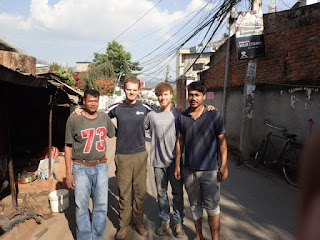
Why did you choose to take a gap year? Why the specific places you chose?
The Gap Year was something that I didn't really think about until most of my college acceptances had rolled in. Once I decided to take a Gap Year in the spring, it became a decision of where I was going to go and what I was going to do. I wasn't really sure and so I started looking at different programs like Rustic Pathways, NOLS, Winterline, Seamester, etc... When I found Where There Be Dragons I knew that it was the program I wanted.
WTBD's main focus is diving deep into the culture of the places they go, and this was something I wanted to experience. Originally I applied for the "Andes and Amazon" trip located in Peru and Bolivia. However, after hearing about Nepal from my phone interview I decided to switch programs. I chose the East, and more specifically Nepal, because of how far out it was from my comfort zone. It's also about as far away from home as you can get, which was something I felt like I needed.
What was your life like in Nepal? What types of things were you learning?
Life in Nepal was, to say the least, different and unfamiliar. There was nothing there I'd ever seen before, so everything was a new experience. It was also my first time traveling to a "third world" country, so seeing the poverty, living conditions, and general environment caused quite a bit of culture shock. Like anything though, you learn to shift your paradigms and become more comfortable with your surroundings.
Everyday was a new day of learning for me, wether it was structured by WTBD or not. Except for the last three weeks, we had a two hour language class every day. We focused our learning on the region we were in, talking about religion (mainly Hinduism and Buddhism), comparative issues, local politics, and worldly issues that affected Nepal. We also studied meditation and yoga practices. During our urban homestay, which lasted about five weeks, we all worked on ISPs (Independent Study Projects). These were all done individually and through a local mentor. People in my group studied everything from yoga and meditation to painting and eastern architecture. I studied blacksmithing, and made knifes called kukuris. The kukuri is a traditional military and ceremonial tool used throughout the Nepali culture and armed forces. The kukuri is a very common symbol of national pride as they were used by the Ghurkas (Nepali military force) to defend Nepal from invading British troops. Nepal is the only failed colonial attempt by the British and because of this Ghurkas have since been invited to serve (and currently do) in the British armed forces.
What about your time at HIES prepared you for Nepal? What were things you couldn’t have possibly been prepared for?
I think that HIES prepared me in the sense of trying new things and not being afraid of failure. HIES always pushed me to go further, explore deeper, and to push myself even when I didn’t have to.
Of course, there were many things I couldn’t have possibly been prepared for, such as the culture shock. Nothing can prepare you to see the levels of poverty, chaos, and ruin seen in countries like Nepal.
What were some details that struck you about the community or about your experience?
What really stood out to me was that even through all the disorder and poverty people still get along and respect each other. There’s hardly any crime and people helping others is a sight seen often. It comes in part from the local religious practices, but I think it also stems from everyone wanting to succeed and become better. As I travelled around the country and explored different cities and villages a common theme I noticed was how older generations support younger generations in being progressive. For instance, one might send their child from the village to Kathmandu rather than have them work in the fields in hopes of achieving higher education and a better paying job. This is limited in part by the social class system of Hinduism, but most of the younger people are seeking modern jobs in lieu of traditional occupations. The downside of this unfortunately is a loss of very unique and ancient traditional culture as cities become more “westernized”.
What have you learned about yourself through your travels?
Aside from bursting the “buckhead bubble” I’ve learned that if I want to do something I can do it, I just have to decide how I want to get there. I’ve learned that even though individuals have different socioeconomic statuses, different religious views, or different sexual or gender orientations we’re all just human and if you put the effort in you can communicate with anyone on a simply human level. I’ve learned the importance of learning such as learning new languages, learning new cultures, and learning new comfort zones. Traveling abroad opens your mind to so many new experiences that you never could have at home, such as eating a goat blood popsicle (don’t recommend it) or hanging off the back of a bus on the highway. One of the most important things I’ve learned is that you can’t expect others to broaden your horizons. You have to get out of your comfort zone and put yourself out there. You might have an embarrassing moment or two, but they’re just times to grow from and laugh about later.
Would you recommend taking time to travel?
Yes. Just go, don’t think about it too much. Leave room for exploration and unexpected adventures.

No comments:
Post a Comment